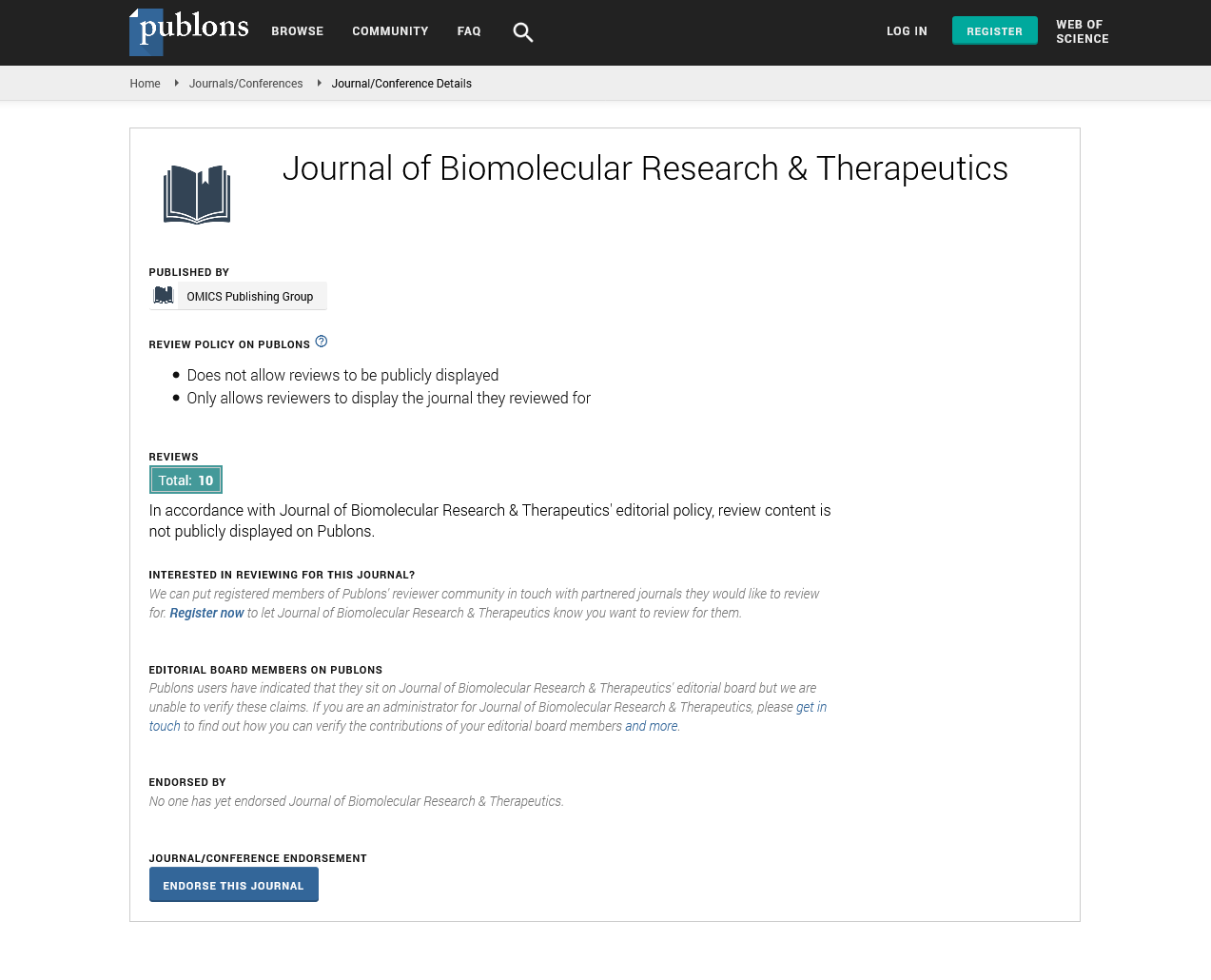Indexed In
- Open J Gate
- Genamics JournalSeek
- ResearchBible
- Electronic Journals Library
- RefSeek
- Hamdard University
- EBSCO A-Z
- OCLC- WorldCat
- SWB online catalog
- Virtual Library of Biology (vifabio)
- Publons
- Euro Pub
- Google Scholar
Useful Links
Share This Page
Journal Flyer

Open Access Journals
- Agri and Aquaculture
- Biochemistry
- Bioinformatics & Systems Biology
- Business & Management
- Chemistry
- Clinical Sciences
- Engineering
- Food & Nutrition
- General Science
- Genetics & Molecular Biology
- Immunology & Microbiology
- Medical Sciences
- Neuroscience & Psychology
- Nursing & Health Care
- Pharmaceutical Sciences
Opinion Article - (2024) Volume 13, Issue 3
Epigenetic Treatments: Enhancing Gene Expression to Treat Disorders
Richard Nicolae*Received: 03-Jun-2024, Manuscript No. BOM-24-26511 ; Editor assigned: 05-Jun-2024, Pre QC No. BOM-24-26511 (PQ); Reviewed: 19-Jun-2024, QC No. BOM-24-26511 ; Revised: 26-Jun-2024, Manuscript No. BOM-24-26511 (R); Published: 03-Jul-2024, DOI: 10.35248/2167-7956.24.13.393
Description
Epigenetics, the study of changes in gene expression that do not involve alterations to the underlying DNA sequence, has emerged as an effective field in the treatment of various disorders. These changes can be influenced by environmental factors, lifestyle, and even therapeutic interventions, making epigenetics a dynamic and adaptable approach to medicine. Epigenetic treatments aim to modify gene expression patterns to restore normal function and treat diseases, offering a new dimension of therapeutic possibilities.
Cancer
Cancer is one of the most extensively studied areas for epigenetic therapy. Aberrant DNA methylation and histone modifications are common in various cancers, leading to the silencing of tumor suppressor genes and activation of oncogenes.
DNA methylation inhibitors: Drugs such as 5-azacytidine and decitabine inhibit DNA Mmethyltransferases (DNMTs), enzymes responsible for adding methyl groups to DNA. These inhibitors can reactivate silenced tumor suppressor genes, leading to reduced tumor growth and improved patient outcomes. They are currently approved for the treatment of myelodysplastic syndromes and certain leukemias.
Histone Deacetylase Inhibitors (HDACi): HDAC inhibitors, such as vorinostat and romidepsin, prevent the removal of acetyl groups from histones, leading to a more relaxed chromatin structure and increased gene transcription. These drugs are used in the treatment of cutaneous T-cell lymphoma and are being investigated for other cancers.
Combination therapies: Combining epigenetic drugs with other treatments, such as chemotherapy, targeted therapy, or immunotherapy, can enhance therapeutic efficacy. For instance, combining DNA methylation inhibitors with immune checkpoint inhibitors has improving anti-tumor immune responses.
Neurological disorders
Epigenetic mechanisms play a major role in brain development and function. Dysregulation of these processes is implicated in various neurological and psychiatric disorders, including Alzheimer’s disease, Huntington’s disease, and autism spectrum disorders.
Alzheimer’s disease: Epigenetic changes, such as DNA methylation and histone modifications, contribute to the pathogenesis of Alzheimer’s disease. HDAC inhibitors have shown potential in preclinical studies to enhance memory and cognitive function by promoting the expression of neuroprotective genes.
Huntington’s disease: In Huntington’s disease, histone modifications are disrupted, leading to altered gene expression. HDAC inhibitors have been explored to restore normal histone acetylation levels and improve neuronal survival and function.
Autism spectrum disorders: Emerging evidence suggests that epigenetic changes may contribute to the development of autism. Targeting specific epigenetic modifications could have innovative avenues for treatment, although this area is still in its early stages of research.
Metabolic disorders
Epigenetic modifications also influence metabolic processes and can contribute to disorders such as obesity, diabetes, and cardiovascular diseases.
Obesity and diabetes: Epigenetic changes in genes involved in metabolism and energy balance can contribute to obesity and type 2 diabetes. Nutritional and pharmacological interventions that modulate DNA methylation and histone modifications are being investigated to improve metabolic health and insulin sensitivity.
Cardiovascular diseases: Epigenetic modifications can affect the expression of genes involved in inflammation, lipid metabolism, and vascular function. Epigenetic therapies aimed at modulating these pathways hold potential for treating atherosclerosis and other cardiovascular conditions.
Advances in epigenetic research
Recent advances in epigenetic research and technology are driving the development of more precise and effective treatments:
CRISPR-based epigenome editing: CRISPR technology has been adapted to target and modify specific epigenetic marks without altering the underlying DNA sequence. CRISPR-dCas9 systems, which use a dead Cas9 protein fused to epigenetic modifiers, can precisely target DNA methylation or histone modifications, advanced for epigenetic therapy.
Single-cell epigenomics: Advances in single-cell sequencing technologies allow researchers to study epigenetic modifications at the single-cell level, providing detailed insights into cellular heterogeneity and the epigenetic landscape of diseases. This information can guide the development of more targeted and personalized therapies.
Epigenetic biomarkers: The identification and validation of epigenetic biomarkers for disease diagnosis, prognosis, and treatment response are progressing rapidly. Liquid biopsies, which analyze circulating tumor DNA and other biomarkers in blood samples, are emerging as a non-invasive tool for monitoring epigenetic changes in real-time.
Conclusion
Epigenetic treatments represent a frontier in the fight against a wide range of diseases. By targeting the regulatory mechanisms that control gene expression, these therapies offer the potential to correct dysregulated pathways and restore normal cellular function. While challenges remain, ongoing research and technological advancements continue to enhance our understanding of epigenetic mechanisms and improve the precision and efficacy of epigenetic treatments. the integration of epigenetic therapies into clinical practice have transforming the treatment landscape for cancer, neurological disorders, metabolic diseases, and beyond, providing the way for next phase of personalized and targeted medicine.
Citation: Nicolae R (2024) Epigenetic Treatments: Enhancing Gene Expression to Treat Disorders. J Biomol Res. 13.393.
Copyright: © 2024 Nicolae R. This is an open-access article distributed under the terms of the Creative Commons Attribution License, which permits unrestricted use, distribution, and reproduction in any medium, provided the original author and source are credited.

